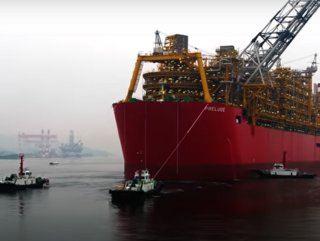Shell reports $6.4bn earnings in Q4 2021

On a day when the UK news agenda was dominated by Ofgem’s confirmation of the rising price cap from April, Shell reported Q4 2021 adjusted earnings of $6.4bn and announced an $8.5bn share buyback programme, leading to an increase of dividend per share by around 4% for Q1 2022, with full year adjusted profit quadrupling to $19.3bn.
Aware of the contrasting nature of both announcements, chief executive Ben Van Beurden struck an empathetic tone in a Q4 2021 results webcast, while reiterating the situation was the result of global supply challenges which cannot be resolved by a single company.
“If you look at the macro situation, it is a difficult situation for households and including for us, for that matter, as we would much prefer a stable and steady market development, rather than the one we’re experiencing at the moment, like a roller-coaster,” he said.
“But it’s undeniably true that the recovery from the pandemic has been strong, particularly in Asia – you could say that’s good news, but it comes with higher energy demand. In places like China, we see an acceleration away from coal, which initially means more gas demand. We are struggling as an industry to keep up with supply. I hope that the extremities we are experiencing will abate.”
He said Shell will continue to focus on infrastructure efficiency and look to bring gas from Asia and other markets to alleviate the UK situation.
But on the prospect of windfall taxes, he said: “I’m not convinced windfall taxes are going to help us with supply or demand, but we are ready to be in dialogue, to see how the situation can be alleviated and what lessons we can learn, so that the system that needs to be built is more fit for purpose to solve the volatility that will no doubt be with us.”
Chief Financial Officer Jessica Uhl said Shell’s focus is switching to a ‘growth agenda and shareholder distributions’ in 2022, with increased focus on mobility, power, CCUS, hydrogen and natural environmental solutions as the energy transition accelerates. Shell pulled out of investing in the Cambo oil field development project in the west of Shetland, in December (click here), but Van Beurden said it still wants to invest in the UK continental shelf. Net debt reduced to $52.6bn by the end of 2021.
Shell’s $24bn Prelude FLNG vessel (pictured) is expected to be out of operation for most of Q1, Van Beurden also confirmed today in the webcast.
Following an electrical fault discovered in one of the battery systems associated with the uninterrupted power supply in December, he said the vessel – the size of 175 Olympic swimming pools – continues to go through “teething troubles”, but maintains it is a “unique asset”.
“It’s not been made easy because of the pandemic – it’s a remote facility, it’s difficult to get people in, and they need to quarantine for weeks before they go on board, so these problems compound the issue a little bit,” he said.






